This is the End Times Financial System They Want to Trap You In (Part 2 of 3)
Step 2: Tokenized Assets
The Book of Revelation describes an end times financial system often referred to as “the mark of the beast system”:
"He required everyone — small and great, rich and poor, free and slave — to be given a mark on the right hand or on the forehead. And no one could buy or sell anything without that mark, which was either the name of the beast or the number representing his name." Revelation 13:16-17 (NLT)
The construction of a system identical to the mark of the beast system in capability and function is underway right now. It’s primarily composed of three elements:
1) Central Bank Digital Currency (CBDC)
2) Tokenized Assets
3) Digital IDs
In Part 1 of this series, we looked at central bank digital currency (CBDC) – what it is, what’s happening right now (current status), and why the public will buy into the idea they need it.
In Part 2, we look at tokenized assets – what they are, what’s happening right now, and why the public will buy into the idea they need them.
Make no mistake, this system is designed as a trap to enslave the people within it. And while I believe the rapture of the church will take place before the mark of the beast system appears during the Tribulation, the infrastructure for such a system is under construction right now. That means, as Christians, we may experience some or all of the elements of this system before we depart this world, so make sure you’re prepared.
What Are Tokenized Assets?
The second element of the end times financial system they’re planning to roll out is asset tokenization. Tokenized assets are real world assets placed on a blockchain. Blockchain, or distributed ledger technology, securely stores records across the nodes of a computer network (click here to learn more). Decentralized distributed ledger technology is what underpins the Bitcoin network, but it can be used to store digital tokens representing almost anything imaginable.
A digital token can be created on the blockchain to represent any physical object, real world asset, or property. But what makes tokenized assets different from other blockchain tokens is they convert the legal ownership rights of those real world assets into blockchain tokens which can be bought and sold seamlessly.
"Tokenization of real-world assets: It’s quite a mouthful, but what does it mean? The short answer is that it’s digital proof of ownership of an asset, represented by a token (or tokens) on a blockchain.
Asset tokenization has the potential to not only replace or enhance current ownership validation methods (such as deeds, titles, or copyrights), but could also allow for easier division of ownership interest."
In other words, instead of your proof of ownership residing at the local courthouse (land title), department of motor vehicles (vehicle title), or brokerage house (stock certificate), proof of ownership will reside on the blockchain.
This opens the door to digitizing every asset on earth. Some of the possibilities include:
Stocks
Bonds
Real Estate (residential, commercial, etc.)
Precious Metals (gold, silver, platinum, etc.)
Collectibles (artwork, artifacts, sports memorabilia, etc.)
Vehicles
Private Credit
And anything else of value which can be catalogued, tracked, and traded…
This creates the ability to buy or sell any of these items with instant transfer of ownership rights. It also opens up new possibilities for traditionally illiquid assets as investors can buy and sell fractional portions of real world assets such as high-rise apartment buildings, priceless works of art, or large tracts of farmland.
"Built on blockchain technology, tokenization converts physical or financial assets into bite-sized, digital representations that can be securely traded or owned in fractional portions on a digital platform."
As we’ll see in a moment, this creates new opportunities for business owners and investors alike.
Smart Contracts
One of the features underlying tokenized assets is an element known as “smart contracts.” Smart contracts are essentially the rules and regulations governing the sale of tokenized assets.
According to Alpen Partners:
"The tokens are equipped with smart contracts, simple programs that are designed to execute as soon as a criterion is satisfied. The smart contracts can determine how the token is purchased, traded, or sold. Additionally, since tokens are based on blockchain, transactions are immutable, traceable, and transparent."
While tokenized assets come with a wide range of benefits, some of those – including traceability and transparency – are also concerns. By their very nature, tokenized assets are not private transactions, and they’re easily traceable.
They also share a key concern with central bank digital currencies – programmability.
"Smart contracts are key to tokenization. They automate agreements by embedding the terms of a contract into self-executing code on a distributed ledger so that processes are carried out without intermediaries. For example, payment can be automatically released upon confirming the delivery of goods, and the blockchain maintains an immutable transaction record."
Just as a Homeowner’s Association (HOA) can restrict a homeowner’s property rights, tokenized assets can restrict the owner’s property rights depending on the terms of the smart contract.
What’s Happening Right Now?
According to InvestaX, "The tokenized RWA market (excluding stablecoins) grew by ~85% year-over-year to reach $15.2 billion by December 2024, spanning diverse asset classes such as private credit, commodities, real estate, and treasuries. Including stablecoins, the total tokenized market soared to $217.26 billion."
Standard Chartered believes we'll see $30 trillion in tokenized assets by 2034, while Boston Consulting Group estimates the world will have $16 trillion in tokenized illiquid assets by 2030.
Here are some examples of real world assets currently undergoing the asset tokenization process:
Stocks
While stocks are already traded electronically, the settlement process includes a number of intermediaries. In fact, most people who think they own stocks, don’t actually own any stocks at all. Instead, they have what’s called a “security entitlement.” In all likelihood, their stocks are held in street name and/or actually owned by a private company called Cede & Company.
Tokenization of stock certificates will allow individual investors to have direct ownership over the shares they own, rather than being dependent on a third-party intermediary. At the end of this article, we’ll talk about why this is so important.
When it comes to tokenizing stocks, Alpen Partners has this to say:
"As blockchain grows in popularity, more businesses are finding it convenient to convert their equity shares to digital tokens. Tokenizing is an easy way to raise capital that a business can issue shares of via digital assets, such as a cryptocoin or token. Tokenized equity can be thought of like any share purchased in a listed company. The only difference is that they are in the form of a digital token rather than physical paper. When a buyer purchases a share in its IPO phase or on the stock exchange, the share is credited to their demat account. When purchasing a stock token, the digital coin or token is being credited to their blockchain-hosted account rather than their demat account. There are several obstacles that one can face in the traditional ways of raising capital for a business. Regular maintenance of books and accounts, ensuring the company is adhering to the strict rules of the stock exchange, challenges faced by business owners, or a bank’s reluctance to issue credit can all get in the way. Equity shares on a blockchain by tokenizing business ownership, on the other hand, is much more flexible when it comes to raising funds. It is a more democratic, low cost, and allows for direct participation of interested investors."
Real Estate
Real estate is another real world asset where ownership rights can be converted into tokens on the blockchain. This offers a number of benefits, including instant transfer of ownership, elimination of third-party intermediaries, and the ability to easily and efficiently buy and sell fractional ownership claims of properties as varied as single-family homes, farmland, high-rise office buildings, and resort hotels.
As an example, we have this from Stansberry Research:
"In October 2018, the St. Regis Aspen Resort became the first of its kind...
To raise money for renovations, the luxury resort's owners decided to sell fractional ownership of the hotel through the Ethereum blockchain.
Digital "Aspen Coins" were priced at $1 each. And accredited investors had to buy at least 10,000 of them to participate. In total, the hotel raised $18 million by selling 18.9% of its ownership to individual investors.
It was the first major tokenized real estate sale in the U.S. But it definitely wasn't the last.
And as you'll see today, the growing appeal of tokenized real-world assets ("RWAs") shows we're just beginning to capitalize on the broad potential of cryptos...
A more-than-$30-million Manhattan development followed the St. Regis' lead shortly after, financing the project by selling its own tokenized coins.
Since then, we've seen commercial real estate, multifamily homes, and even churches offer tokenized ownership on the blockchain.
You see, the blockchain makes buying and selling real estate simple and accessible. Investors don't have to deal with title transfers, red tape, middlemen, and all the fees. And you can often invest in large properties for a few hundred or thousand dollars."
With the ability to essentially “go public” with any type of property, expect developers to aggressively tokenize almost every property they can. By luring in smaller investors, they markedly increase demand, driving prices higher than they otherwise would be under traditional real estate transactions.
This work is a full-time endeavor for our family. Without the support of readers, viewers, and listeners like you, the work we do here would not be possible. If you find this article helpful, please consider becoming a paid subscriber.
As a paid subscriber, you’ll get weekly paid-subscriber videos and/or articles, a monthly live Q&A via Zoom, commenting privileges on every post, access to the complete archives, and more. Most of all, you get to support this work which spreads the Good News of Jesus Christ to tens of thousands of people in over 100 countries.
Forest Land
Even non-cash flowing real estate is being tokenized. For example, many governments offer “carbon credits” to offset supposed greenhouse gas emissions generated by a company’s operations. Companies often receive these carbon tax credits by “offsetting” certain activities with planted trees or the preservation of forests or wetlands.
As we read in Forbes, some companies are tokenizing forests, wetlands, and other areas and selling off the fractional ownership interests to companies in search of carbon credits:
"The goal: saving the planet.
The tool: blockchain, tokenization, and a stock exchange for natural value.
The result? The world's first nature-backed financial instruments, according to CEO Merit Valdsalu.
"Single Earth is an online platform that enables forests, wetlands, and other natural resources to generate profit without being sold as raw materials … but instead as carbon offsets and biodiversity offsets,” Valdsalu told me recently on the TechFirst podcast. “We reward landowners for not clearcutting their forests and not digging up their wetlands … but instead, for preserving the ecosystems that actually keep all of us alive.”
As a concept, it’s simple. Single Earth tokenizes land, forests, swamps, and biodiversity: any area of rich ecological significance. Companies, organizations, and eventually individuals will be able to purchase those tokens and own fractional amounts of those lands and natural resources, getting carbon offsets in return as well as ongoing ownership rights."
When even trees and marshes are on the blockchain, you can be sure the end result will be everything on the blockchain. And that’s exactly where all of this tokenization is headed. In due time, they’ll tokenize every physical object on the planet.
The Entire Supply Chain
Think I’m exaggerating? Think again. The incentives already exist for businesses around the world to tokenize their inventory so they can track and follow their goods through every step of the supply chain.
"Tokenization is the process of representing physical or digital assets as computer coding, called tokens, on a blockchain. In supply chain management, this means creating a blockchain-based equivalent of physical goods or documents.
For instance, a batch of pharmaceuticals can be tokenized, and its blockchain representation will carry all relevant data — such as origin, handling conditions, and expiration date. As the batch moves through the supply chain, the token tracks its journey immutably, automating agreements through smart contracts.
AVC Global is a supply chain platform with track-and-trace technology and supply chain financing available through a Fintech platform on a distributed ledger. For its clients in the pharmaceutical industry, AVC Global uses a “double digital notary” system that verifies every step of a drug through the supply chain."
What does this mean? It means, eventually, every product on the store shelf and everything you buy online will be tokenized.
Again, according to Hedera:
"Tokenization simplifies and secures these processes by creating a single source of truth. Some applications of tokenization in supply chains include:
Invoice tokenization. Converting invoices into digital tokens can streamline financing, reduce fraud, and provide transparency in payment cycles. This approach has proven especially effective in deep-tier supply chain finance.
Inventory tokenization. By tokenizing inventory, businesses can improve inventory visibility and enable real-time tracking, reducing overstock and stockouts.
Product tokenization. Industries like seafood have used product tokenization to enhance traceability."
In other words, one day it will be nearly impossible to buy or sell anything that isn’t tokenized. And that should concern you. Because of one of the primary features of tokenization is the ability to track and trace ownership – if not geographical location – in real-time. This means the government, if not everyone, will have insight into everything you own.
How Will the Public Be Sold On It?
Given the lack of privacy, why will the public go along with this? I believe we’ll see three primary arguments used to foist tokenized assets onto the public:
1) Efficiency/Convenience
With the emergence of quantum computing and artificial intelligence, tokenization promises to make supply chain and inventory management more efficient and accessible. Smart contracts cutting out intermediaries, anti-counterfeiting safeguards, and other innovations promise to significantly reduce costs and improve system reliability.
Businesses will adopt tokenization of real world assets as well as their own inventory to cut down on costs and maintain profits. Consumers will likely have no choice but to use, buy, and sell tokenized assets unless they’re willing to give up substantial convenience and/or affordability.
2) Security / Criminal Surveillance
Government and law enforcement will sell the idea of tokenized assets under the premise of providing greater security and the necessary tools to counter criminal activity.
For example, under the heading "Innovation in Supply Chain Resilience," Hedera cites the following benefits:
"The future of supply chain resilience is bright, with ongoing innovations that can potentially address current challenges and unlock new opportunities:
Cybersecurity. Advanced encryption and secure consensus mechanisms will play key roles in protecting sensitive supply chain data.
End-to-end visibility. Innovations will focus on creating comprehensive visibility all along the supply chain, from raw materials to end consumers. Platforms integrating AI, IoT, and blockchain promise a seamless flow of information across all stages.”
This same “visibility” of real world assets, particularly in the financial realm, gives law enforcement the means to counter money laundering, drug dealing, terrorist fundraising, and other criminal activity.
3) Fraud Prevention
Tokenized assets increase fraud prevention as tokens on the blockchain convey clear, immutable, and transparent ownership rights. I believe this will come to the forefront of public discussion in the aftermath of the next financial crisis – one that will be the greatest financial crisis ever seen.
For instance, while illegal in most cases, companies continue to engage in “naked short selling.” What is naked short selling? It’s when a seller sells a security he or she doesn't own or hasn't borrowed.
As an example, pretend you own a share of The Hershey Company. Someone else comes along and sells your share short without your knowledge (this happens more often than most people think). The seller hopes the price of the share declines. They then buy the share back in the open market at the lower price and pocket the difference between what they originally sold it for and what they bought it back for.
The problem? When the short seller sells the share, by definition, someone else buys it. You still think you own the share, and the person who bought the share sold short thinks they own it. But both people can’t own the same share at the same time.
This isn’t a problem until it is. What happens in a complete market meltdown where the global financial system starts to unravel? Only one person can end up with the share, when several people might be under the belief they own it. That means everyone but one person is out of luck.
In such a scenario, the public will be outraged – especially when it means many people will experience catastrophic loss of their life savings.
The government will come along and offer a solution – most likely the cash equivalent of the missing financial securities, but paid in central bank digital currency (CBDC).
Then, they’ll offer a solution to make sure something like this never happens again – something that will ensure naked short selling is banned forever – they’ll tokenize all stocks, bonds, and financial securities.
On the blockchain, all these real world assets will have clear, immutable, and transparent ownership on a public-facing blockchain.
In the aftermath of a market crash, where so many people lose out, the government will promote the ability of tokenized assets to prevent future fraud and abuse. Fresh off the shock and outrage of a recent crisis, the general public will embrace tokenized assets. In fact, they’ll demand them!
In addition, the government will claim tokenized assets are essential to updating financial regulation so the public can benefit from a 21st Century financial regulatory system in a 21st Century world, rather than remaining stuck in the past, reliant on outdated 20th Century financial regulations.
In Part 1, we pointed out how they'll use fear to push central bank digital currencies:
"They’ll claim CBDC will give regulators much needed insight into the “shadow banking system” and systemically important non-bank financial institutions (entities that don’t currently fall under the same regulatory standards as banks). And with this new oversight, such a crisis will “never happen again.”
Will governments and central banks take responsibility for the financial meltdown – one created by their decades of terrible policies and mismanagement? Of course not. They’ll assign blame to “bad actors.”
Rogue speculators… Risky hedge funds… Fraudsters and Ponzi scheme operators…
They’ll blame all the “bad actors” (with the exception of themselves), and they’ll claim CBDC will enable law enforcement to identify such criminals instantly.
For example, during the Great Financial Crisis, the world became aware of Bernie Madoff – notorious facilitator of the greatest Ponzi scheme in history. It’s almost certain we’ll see a similar scheme uncovered in the next crisis.
“We could have stopped this,” they’ll say. “With CBDC, we could have known in real-time the fraud operator had misallocated funds. We would have seen investors send him their money, and we would have seen him use it to buy yachts and mansions rather than stocks and bonds.”
In doing so, they’ll claim CBDC is necessary to prevent another crisis like the one that just unfolded. Ultimately, the public will embrace CBDC as a “safeguard” against future financial crises.
But it’s an empty promise."
They’ll use the same argument to push tokenized assets. “We could have stopped this,” they’ll say. “With tokenized assets, we would have known Bernie Madoff didn’t acquire any stocks, bonds, or other financial instruments on behalf of his investors.”
The public will gladly buy in, and the government will have surveillance over every transaction on earth. With tokenized assets, they’ll know who owns what and when. They’ll have insight into everything that’s bought and sold. And with CBDCs, they’ll have insight into the other half of every transaction – the currency used to facilitate the transaction. This will give them the ability to track every buy and sell transaction in real time.
And the roll out of tokenized assets will likely mean this system operates on a global scale.
A Global System
Much like CBDCs, which the Bank of International Settlements is working to standardize under Project Agora, tokenized assets face a problem when it comes to cross-border and inter-jurisdictional transactions. Each nation, state, and locality feature different laws and regulations.
To overcome these barriers, a global standard needs to be developed. And it doesn’t necessarily mean every nation has to agree to the terms. Whatever nation initially dominates in tokenized asset trading volume will likely set the rules by default with marketplace demand establishing global standards in the process.
In essence, tokenized assets will become global assets with global rules attached to them.
Even with different tokenized asset systems operating in different jurisdictions, tools to facilitate borderless transactions will spring up in the free market.
As Hedera notes in regard to interoperability:
"Different stakeholders often use different systems, so it's a challenge to integrate tokenized solutions seamlessly across the supply chain. Standardized protocols and APIs are essential to bridge these gaps. Without these, data silos and miscommunications can undermine the efficiency and transparency that tokenization seeks to provide. Also, the lack of universal standards complicates cross-border operations, particularly in global supply chains."
Conclusion
Tokenized assets will give the government programmable control and insight into half of all transactions in the economy – the remaining half that CBDCs do not already encompass.
Programmable smart contracts embedded in tokenized assets will set the rules and requirements for the buying and selling of these digital tokens. What happens when the government embeds rules that forbid certain people from buying or selling certain types of tokenized assets or any tokenized assets at all?
In such a case, the government will have power over every buy/sell transaction – a power clearly called out almost two thousand years ago in the Book of Revelation.
In Part 3 of this series, we’ll talk about the final element that will give the government all the remaining control not already taken via CBDCs and tokenized assets – digital IDs.
As mentioned previously, Christians may experience some or all of the elements of this oppressive financial system rollout before we depart this world. So make sure you’re prepared for both the Great Reset and a bank holiday.
If you liked reading this, please click the ❤️ button on this post so more people can discover it on Substack 🙏 or share it with your loved ones and spread the Good News that Jesus is coming!

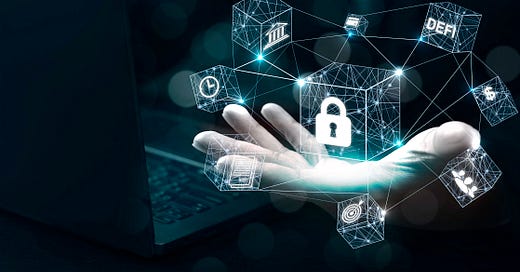



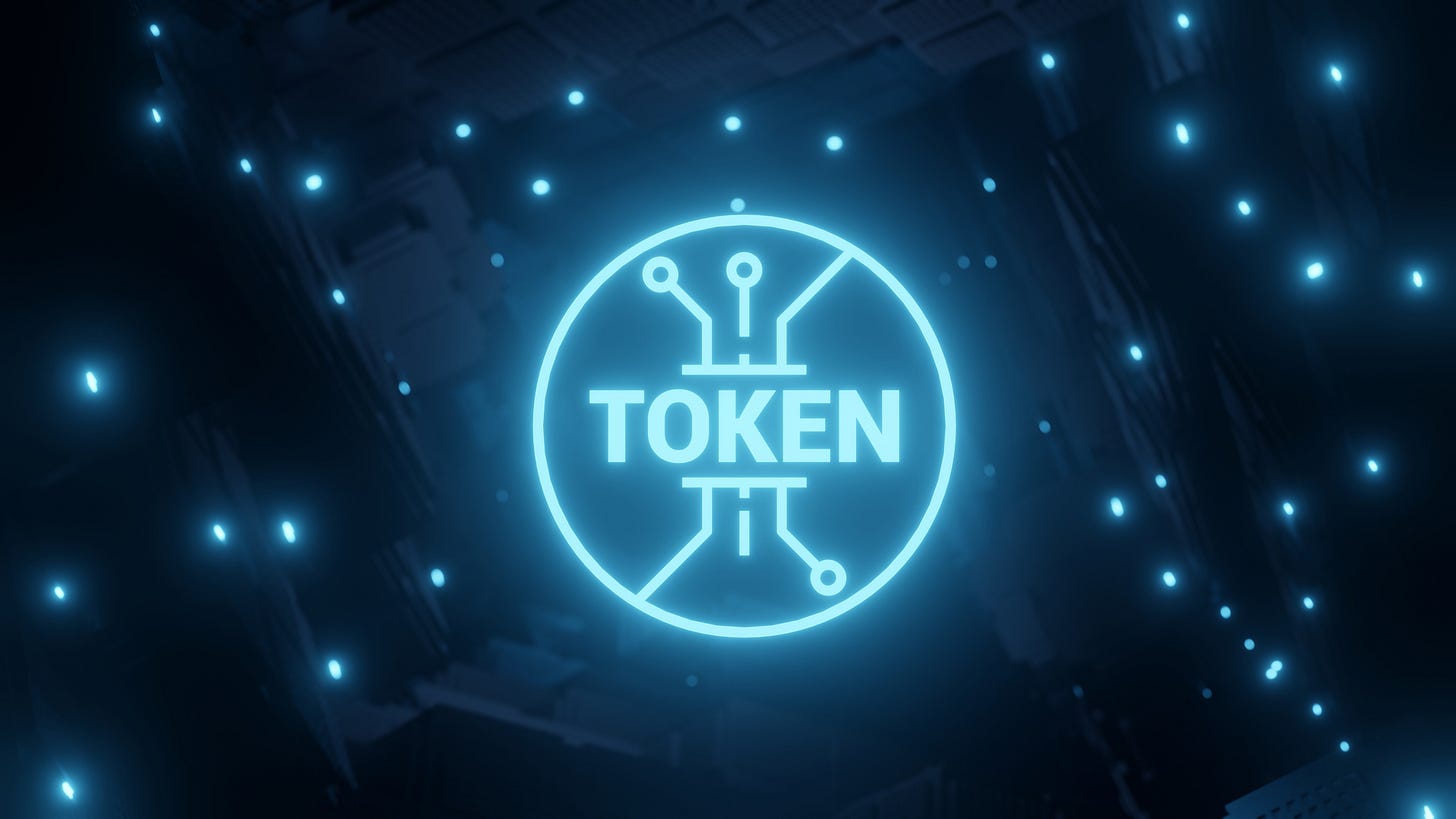
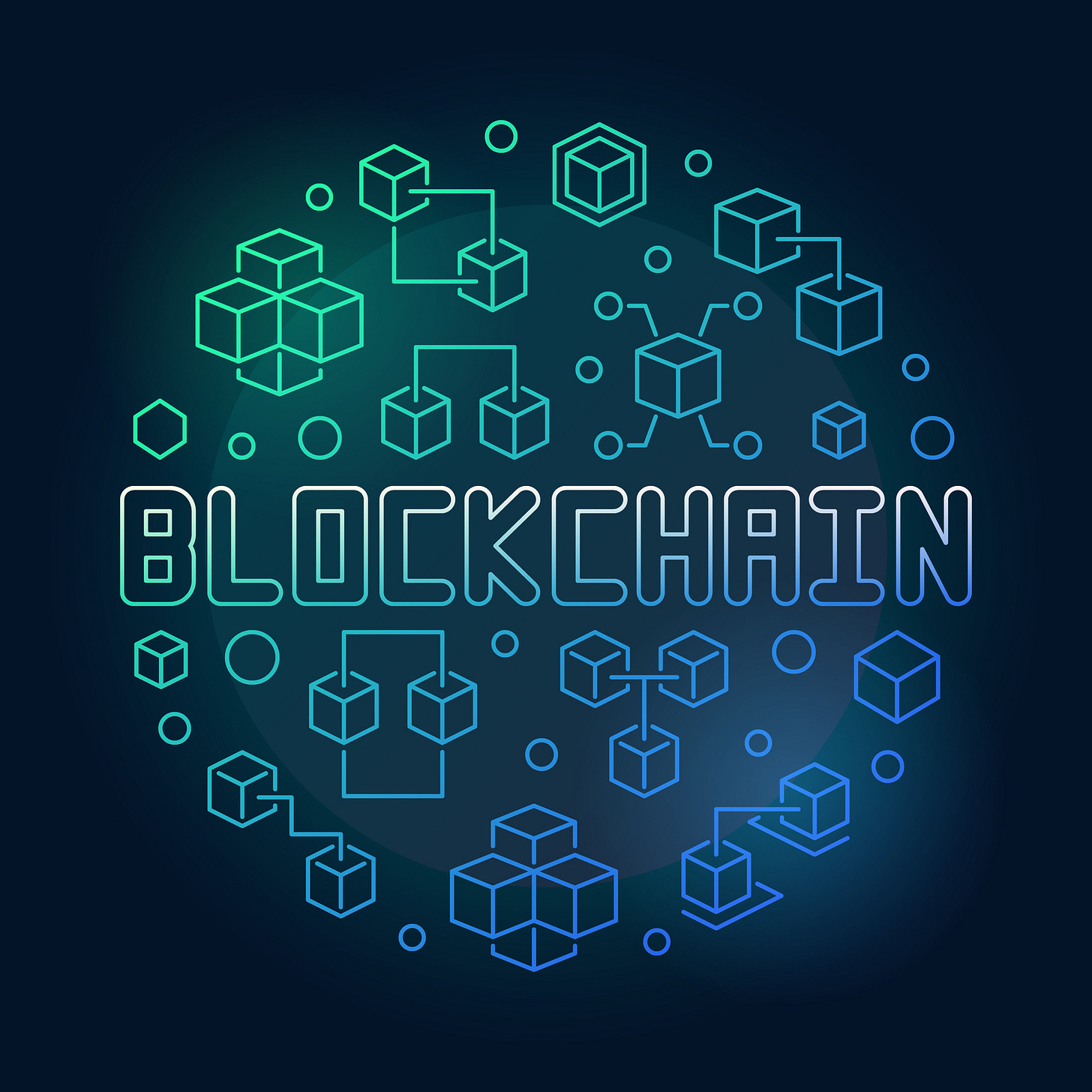
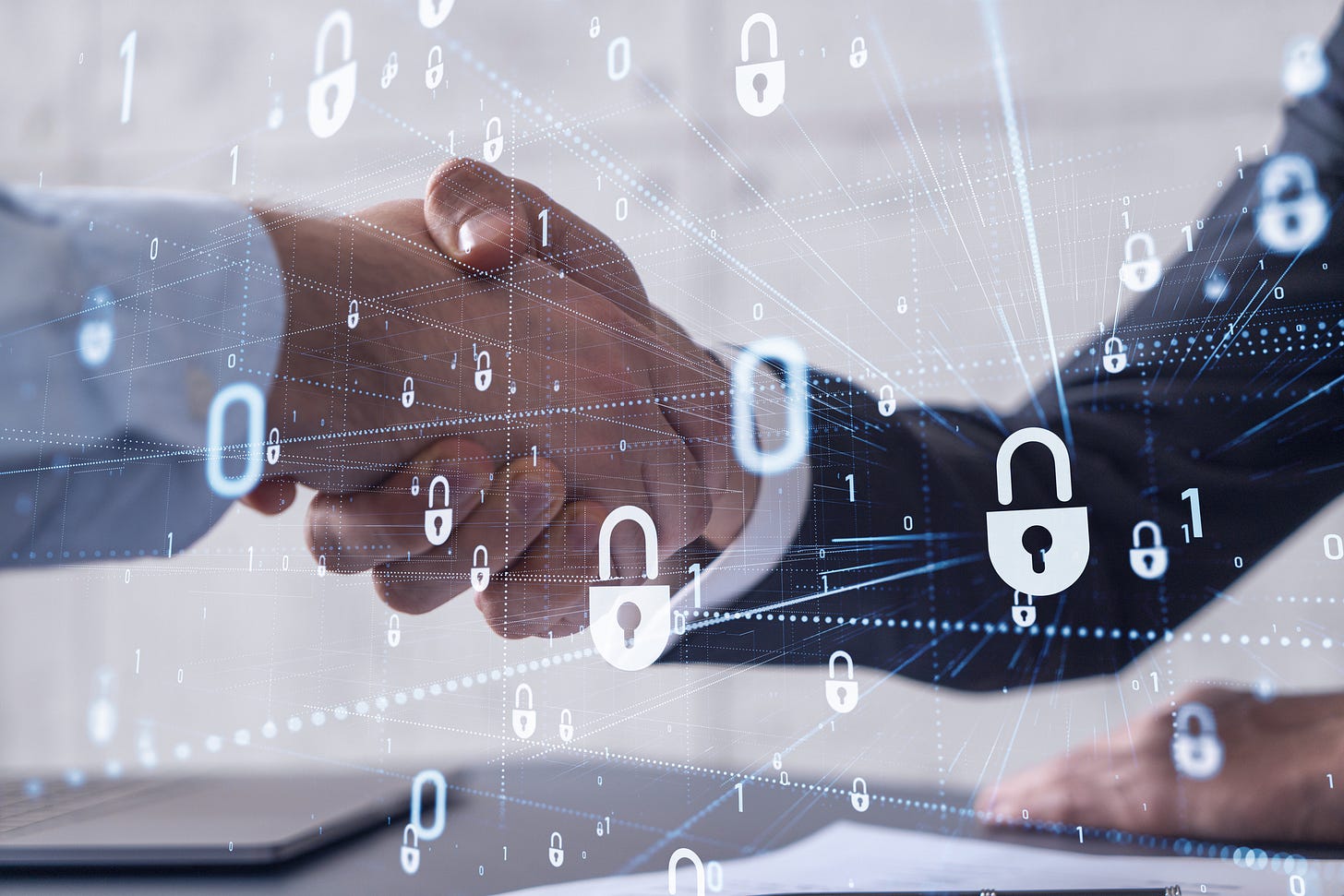
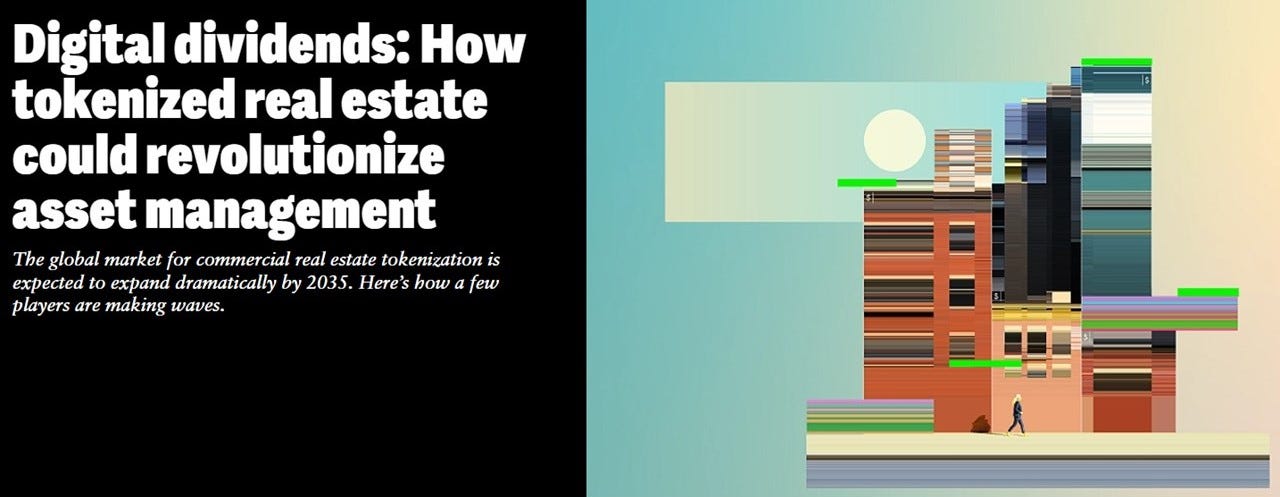

Hi Britt and Jenny and family, God's blessings for you all. Thank you again for keeping us up to date with everything.
I pray, We are not here 🙏, but only God knows. I'll keep praying and looking for Our Lord Jesus Christ Coming 🙏 ❤️.
Thanks Britt, I'm not super up to date on crypto currency but have heard and watched you for over a year. I feel you are a genuine Christian focused and concerned for the true Church of Christ Reminant. A new paid subscription follower and one who looks forward to meeting you in Heaven!
Rob Lewis